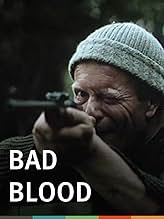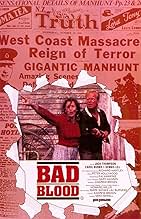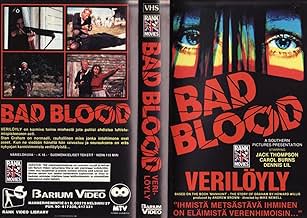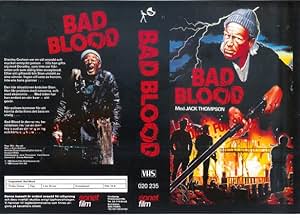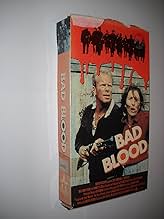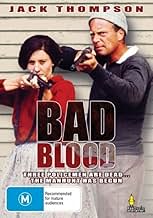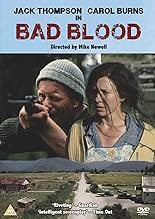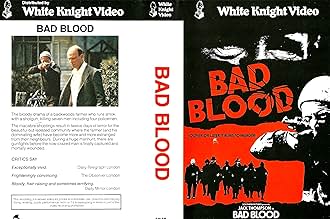Adicionar um enredo no seu idiomaDuring World War 2, a farmer in New Zealand murders seven people, and the police, along with local Maori trackers, hunt him in the bush country.During World War 2, a farmer in New Zealand murders seven people, and the police, along with local Maori trackers, hunt him in the bush country.During World War 2, a farmer in New Zealand murders seven people, and the police, along with local Maori trackers, hunt him in the bush country.
- Direção
- Roteiristas
- Artistas
Alan Jervis Wilks
- Ralph Frederic
- (as Alan Jervis)
- Direção
- Roteiristas
- Elenco e equipe completos
- Produção, bilheteria e muito mais no IMDbPro
Avaliações em destaque
This film is based around a true story and the factual novel Manhunt - the story of Stanley Graham. One of the better things about this movie is the lack of sensationalism. Usually in stories of similar content the writers or director choose one standpoint from which to tell the tale. Here though, the writers, Andrew Brown & Harrold Willis, along with the director, Mike Newell, have decided in neutrality. This gives the viewer full control over what they choose to believe.
Newell chooses to keep the pace steady and even. This works well with the concept of setting the facts before the audience. It allows them to have time to consider what's happening in the story and to draw their own conclusions. This is one of the types of movies I prefer. One that wants and requires audience participation. There's nothing new or exciting about the camera work or the direction. Though, Newell does give his public some nice iconic shots to keep their interest.
As for the story, Brown and Wills give the audience a straight-forward facts based tale of a mentally confused man... or was he?
For some reason, during World War II the New Zealand government sequestered fire-arms. Farmer, Stanley Graham, will not give up his rifle. I have to admit the law appears strange. If you were in the National Guard you could keep your fire-arms and even if you were a woman you could keep your guns. Graham's wife is allowed to keep her .22 rifle and later she purchases a .33 to replace her husbands. I'm not sure if it was farmers who the law applied to. Or if Graham was of Germanic descendants. Either way, the law only helps to cement Graham's paranoia that the government and the townsfolk are out to get him.
The townsfolk are ambivalent towards the family. As time passes though they become more concerned and worried and the gossip starts. When Graham and his wife hear the hushed tones of their neighbours as they pass by their paranoia grows. So when anything bad happens on the farm it's not the hand of God or bad luck; it's the work of their neighbours. So when the police come to take away the rifles it's not surprising when things get out of hand.
The way the story is told you're not sure that the townsfolk aren't responsible for some of the family's bad luck. You also get the idea that Dorothy Graham may be a major contributor to her husband's persecution complex. Is she as broken as him? Or is she being a good wife and standing by him, come what may? Sometimes a good wife can get you killed...
The actors are good in their parts. None of them stands out as being better than the rest and this is perfect for this movie. It adds great strength to the normalcy of the characters and situation. This is one of the rare times that being average actually helps propel the story and make the movie stronger.
This is a movie I would recommend if you like reality-based tales. It's enjoyable, thought-provoking, and powerful. I'm still thinking about the story and it's been three days since I watched the film. I'm also thinking about hunting out the book as novels tend to go into more depth... Well worth a watch.
Newell chooses to keep the pace steady and even. This works well with the concept of setting the facts before the audience. It allows them to have time to consider what's happening in the story and to draw their own conclusions. This is one of the types of movies I prefer. One that wants and requires audience participation. There's nothing new or exciting about the camera work or the direction. Though, Newell does give his public some nice iconic shots to keep their interest.
As for the story, Brown and Wills give the audience a straight-forward facts based tale of a mentally confused man... or was he?
For some reason, during World War II the New Zealand government sequestered fire-arms. Farmer, Stanley Graham, will not give up his rifle. I have to admit the law appears strange. If you were in the National Guard you could keep your fire-arms and even if you were a woman you could keep your guns. Graham's wife is allowed to keep her .22 rifle and later she purchases a .33 to replace her husbands. I'm not sure if it was farmers who the law applied to. Or if Graham was of Germanic descendants. Either way, the law only helps to cement Graham's paranoia that the government and the townsfolk are out to get him.
The townsfolk are ambivalent towards the family. As time passes though they become more concerned and worried and the gossip starts. When Graham and his wife hear the hushed tones of their neighbours as they pass by their paranoia grows. So when anything bad happens on the farm it's not the hand of God or bad luck; it's the work of their neighbours. So when the police come to take away the rifles it's not surprising when things get out of hand.
The way the story is told you're not sure that the townsfolk aren't responsible for some of the family's bad luck. You also get the idea that Dorothy Graham may be a major contributor to her husband's persecution complex. Is she as broken as him? Or is she being a good wife and standing by him, come what may? Sometimes a good wife can get you killed...
The actors are good in their parts. None of them stands out as being better than the rest and this is perfect for this movie. It adds great strength to the normalcy of the characters and situation. This is one of the rare times that being average actually helps propel the story and make the movie stronger.
This is a movie I would recommend if you like reality-based tales. It's enjoyable, thought-provoking, and powerful. I'm still thinking about the story and it's been three days since I watched the film. I'm also thinking about hunting out the book as novels tend to go into more depth... Well worth a watch.
Admittedly the title sounds like it's stolen from a lousy and cheesy 80's B-slasher movie, but "Bad Blood" is one of the most hauntingly dramatic depictions of a real-life human tragedy ever made. Set in New Zealand in 1938 and revolving on painful facts as they occurred there, "Bad Blood" tells the story of Stanley Graham and his wife Dorothy. They're outcasts in the small village community because of their rude and asocial behavior and the accumulation of financial problems slowly drives them to insanity. Stanley nearly has to go to prison for refusing to turn in his riffles and the woeful regards of the townsfolk become more and more hostile when the Grahams accuse them of poisoning their cattle. The script slowly and atmospherically builds up towards the inevitable tragedy of Stanley going irreversibly berserk and butchering seven people during a nightmarish rampage. This beautiful period piece, with marvelous costumes and set pieces, draws a mesmerizing portrait of human paranoia and despair. It also frighteningly illustrates how quickly a chain of little and seemingly insignificant events can escalate into a bloodbath, and that's truly disturbing to say the least. The sober music and gloomy photography epitomize the depressing tone of the film and Jack Thompson gives away one of the most perplexing performances I've ever seen. He should have received awards for his role, and the film in general as well for that matter. Carol Burns is equally amazing as his Dot, who may not have killed anyone but who's at least as dangerous as her husband, if not more. The climax sequences, revolving on the extended manhunt for Stanley after he fled into the open country, are also very gripping and effectively revealing the monstrous nature of people. Suddenly, the little town is overrun with people carrying riffles, most of them even unaware of the details of what happened exactly, simply to join the vigilante hunt for Stanley. No less than Mike Newell directed this sadly obscure little gem back in 1981. Nowadays he's an acclaimed director of slightly more light-headed films, like "Four Weddings and a Funeral", "Love in the Times of Cholera" and "Mona Lisa Smile". The fact that Newell was born and raised in England makes it even more admirable how he's capable of reflecting the typical New Zealand characters, culture and WWII background. I'm not aware of "Bad Blood" being available on DVD now, but the day it comes out make sure you grab a copy of this tense masterpiece. I certainly will.
Hollywood made Stallone's First Blood, which spawned a slew of profitable sequels. This simple film is First Blood lite, New Zealand Style. It is difficult to find a protagonist or antagonist in this film. Some will root for Stanley Graham and his family, while others will see them as obviously insane and in need of removal from society. This real life event was tragic for eight families. The seven that lost a loved one, and the one that lost its husband and father. There is also a question about the involvement of the wife in this film, beautifully played by an unknown New Zealand actress. The tragedy of the film is arrogance and insensitivity. The authorities of the village seem arrogant and insensitive to the plight of the wife and children of this disturbed man, And there is a good case that the wife was also disturbed. And what about these two poor children? I guess they wound up in social services. After a slow start and without the benefit of translation and subtitles of New Zealander language, the film kicks into high gear. New Zealand, at times, and in most places, is almost like heaven on earth. But at other times, it can descend into hell on earth. So too, are the people in this story; caught somewhere between heaven and hell. A riviting story worth watching.
True story set in a farming community in New Zealand during WW2 where the government decrees that all firearms must be collected by the police. However when the police approach increasingly paranoid, broke and struggling to keep his family fed Stan Graham's (Jack Thompson) he refuses to hand his weapon over and ends up killing seven people including a number of policemen. He is then subject to one of the biggest manhunt's in New Zealand's history.
Whilst certainly gritty and brutal with Stan depicted as a simple, but ruthless killer, you do feel a degree of sympathy for him and his wife as they are left with nothing and facing a bleak future. The local townsfolk are none too bright either, generally disliking the family and treating the hunt as a giant jolly never seemingly understanding what they have on their hands. The case became a considerable cause celebre and political hot potato in New Zealand as in some parts Stan was viewed as a hero in such socially troubling times. Quite excellent performances from Thompson and Carol Burns as his supportive but equally crazed wife, this is now rightly seen as a New Zealand classic.
Whilst certainly gritty and brutal with Stan depicted as a simple, but ruthless killer, you do feel a degree of sympathy for him and his wife as they are left with nothing and facing a bleak future. The local townsfolk are none too bright either, generally disliking the family and treating the hunt as a giant jolly never seemingly understanding what they have on their hands. The case became a considerable cause celebre and political hot potato in New Zealand as in some parts Stan was viewed as a hero in such socially troubling times. Quite excellent performances from Thompson and Carol Burns as his supportive but equally crazed wife, this is now rightly seen as a New Zealand classic.
This may be less appealing to American tastes, but to British tastes it is a reasonably well made movie.
The period elements are really well done. It does not try to manipulate you emotionally like a lot (all!) of Hollywood so maybe that is what haters crave along with supersaturated sensory overload.
It is a straightforward tale based on a real life story..
Sometimes slow and that actually was how things were then in NZ, especially I imagine the west coast of the South Island.
I found this for a buck and it's a buck well spent.
For 1981 it is excellent for NZ. Some aspects are begging to be made more tense and this is why is it is a 7.
The period elements are really well done. It does not try to manipulate you emotionally like a lot (all!) of Hollywood so maybe that is what haters crave along with supersaturated sensory overload.
It is a straightforward tale based on a real life story..
Sometimes slow and that actually was how things were then in NZ, especially I imagine the west coast of the South Island.
I found this for a buck and it's a buck well spent.
For 1981 it is excellent for NZ. Some aspects are begging to be made more tense and this is why is it is a 7.
Você sabia?
- CuriosidadesActors playing shot policemen, who had to lie on the floor in pools of blood for long periods of time, to relieve the boredom, would sing and whistle the Monty Python song "Always Look on the Bright Side of Life", which had been at the time recently popularized in the movie A Vida de Brian (1979).
- ConexõesFeatured in Century of Cinema: Cinema of Unease: A Personal Journey by Sam Neill (1995)
Principais escolhas
Faça login para avaliar e ver a lista de recomendações personalizadas
Detalhes
- Data de lançamento
- Países de origem
- Idioma
- Também conhecido como
- The Shooting
- Locações de filme
- Nova Zelândia(filmed entirely on location in)
- Empresas de produção
- Consulte mais créditos da empresa na IMDbPro
- Tempo de duração
- 1 h 45 min(105 min)
- Cor
- Proporção
- 1.85 : 1
Contribua para esta página
Sugerir uma alteração ou adicionar conteúdo ausente

